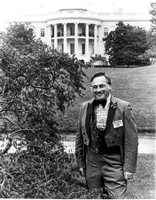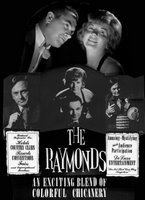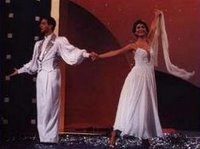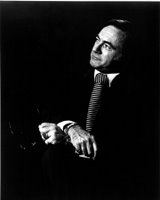2/18/2006

When I was in high school, I worked at what is one of the greatest magic shops in the world, The Magic Art Studio, in Watertown, Massachusetts. The shop's creator and owner of 30 years is Ray Goulet, a retired professional magician and magic collector, historian, and publisher. Ray is known and respected by all circles in the magic community. Whether touring David Copperfield around his one-of-a-kind private "Mini Museum of Magic" or patiently teaching a magic trick to a first-timer in the shop, Goulet treats everyone he knows with respect. You can visit his website here.
In this interview, which I will transcribe this later, I asked Goulet about how newcomers can break into magic and on "playing the part" of a magician. In addition, he speaks on magicians Marvello, Lafayette, John Fisher, and quick change artists. Goulet also explains the presentation of his Russian Roulette mentalist act.
DISCLAIMER: This interview is for entertainment purposes only, especially the description of Russian Roulette. Chris Britt, Ray Goulet, and Magicinterviews take no responsibility for any injury or death resulting from any attempt of such a routine or any similar routine described in the interview.
Magicinterviews: What advice do you have for magicians who want to perform?
Ray Goulet:
I think the good work would be to break into children’s shows. That is the avenue where there’s an awful lot of work if you wanna pursue it, you wanna get out there and do it. As you know – you booked yourself – and most of the time, you have to book yourself. And I did that even when I was younger because I wasn’t qualified to go to agents.
A secret I learned is when I went to this non-union agent. Her name was Peggy Tarbox, very active as a non-union agent. And I walked into her office, and she said, “Who are you?”
And I said, “I’m Ray Goulet, and I do magic.”
She said, “What kind of magic?” And I explained it.
And she said, “Well, how good are you?”
I says, “I think I’m pretty good.”
She said, “Okay. You come back in a month or two when you’re good.”
Probably my best breaking-in point was working local for this woman named Peggy Flanagan, who was booking USO. And I would go in her Cadillac, which had no heater. And I would go into wards, like in the Cushing General, the great Marine hospital. Charlestown, to the Navy Yard.
I did these free shows. I did 500 free shows. 500 of ‘em. And how you worked was there was a singer or a dancer; usually there were both, singer and a dancer, and a piano player. 
Well, my agent, Peggy Flanagan, was also the piano player. And her husband and her would drive out the acts, meet her in Kenmore Square, Boston. They would drive us – of course, we froze most of the time – drive us to these hospitals.
And I never forget. The first one I did was the Cushing General, and all I had to do was 12 minutes. However, the dancer went on. Now, we had to push this piano. I had to put my suitcase on top of this upright piano with her husband, and we pushed into a ward. And I had to set up behind the piano while she played some music to start the show.
And then she had a dancer come out and do a tent dance. And then I went on and did my act, and brought it back behind the piano; packed it back in the suitcase; put the suitcase back on the piano while the dancer went out and did another number, or a singer took place at that time. Then we would have to take, like, push it into another ward.
Well, the first night, I almost thought I was never gonna be in show business ‘cause I did nine wards. I was so exhausted.
And what did they give us? After the show, we got a cup of coffee and a donut. And then we rode home to Kenmore Square, freezing. And I carried my suitcase. And I didn’t have a car at that time. And I took the bus – the trolley, actually, the trolley – from Kenmore Square to Watertown, and then walked a mile and a half with my suitcase.
But you know, those are great experiences, after you’ve done them. They’re not very nice when you do ‘em but, however, it’s great experience. It shows you, well, if I did this, I can do anything.
Magicinterviews:
Magicinterviews: Fit the part.
Ray Goulet: They don’t fit the part.
Magicinterviews: How do you suggest they fit in, and kind of deal with – in the same way that you didn’t want to do silk magic?
Ray Goulet:
Well, mine was a little different then I would think that most. First of all, I was sort of a rough-and-tumble guy. I played all the sports in schools. I enjoyed sports, and I enjoy roughness. I mean, I wasn’t what you’d call a wise guy, but I never cowed down to anybody. In fact, if they even came near me – I mean, they wanted a fight, they got it. And I’m not happy about that part of it.
However, I would never go into a play when I was in parochial school. They used to say you’re never gonna be anything but a rubbish pick-upper, you know? So I should actually pull the curtain, or sweep the floors, ‘cause I was shy.
I wasn’t shy amongst my own people – the guys that I chummed with. I was shy that, for me, I never thought I’d ever be on stage. I mean, the furthest thing from my mind.
And I loved magicians, and I loved to watch them. But I never thought I would get into magic.
And it really came about by playing CYO, for the Catholic Youth Organization, in Boston. And the fella that was with me that played, Paul Burns, took me up to the joke shop. And the man behind the counter kept vanishing this handkerchief in his hand. And I said I have to buy one of those. I bought that and did it for the guys on the corner, or every place else. I must have done it hundreds of times. And then I dropped it for a year or two.
But then I picked up this little magazine, and it said Max Holden’s Magic Shop – ‘cause I never knew there was a magic shop in Boston. They were joke shops.
So I went in there. And I see this kid in there, after two or three times that I visited the shop.
I looked over and I saw this fellow, this kid. And I said, “Hey, do I know you?”
He said, “I don’t think so.”
But he used to buy some more magic. And we got to talkin’. And I said, “Well, where are you from?”
And he said, “Watertown.”
I said, “I’m from Watertown. I must have seen you on the streets.”
He said, “Probably, but I don’t know you.”
Well, as we talked more, I found out that he was the newsboy that delivered newspapers to my house. He lived on this street, Spring Street. I lived up at the west end of town.
So he invited to me his home. And when I went there, he was now doin’ nightclubs. He was a couple of years older than me. 
And he had two rooms in his attic, right on the corner of Spring and Summer Street. I never forgot it. And I walk up there, and I see these posters and everything. Malcolm, the Boy Wonder. Malcolm the Magician. This and that. And then shows with magic on them. I got so intrigued with all of this that I decided magic was gonna be for me.
Well, being sort of a rough-and-tumble guy, it kinda was very difficult for me to wave a silk in my hands and do these things. These were sort of feminine. And to me, I was definitely not – had any femininity in me. I was a man’s man in the sense of the word.
Magicinterviews: Right.
Ray Goulet:
And so but I had to learn that that isn’t just for women. I should think, who were some of the greatest tailors in the world? Men. Who were some of the greatest artists in the world? Men. That doesn’t mean that they’re womanlike. That’s what it is, you know. That was there problem.
And I watched a couple of magicians who did silks, and did manipulation with balls, and things like that. And I said no, I guessed – you know – they don’t look like they’re feminine in any way.
Magicinterviews: Right.
Ray Goulet:
In any way. You know. And that’s how I got started. And from that point on, he and I performed – after I did the USO – we performed the M&R Magical Parade. We started doin’ our own shows in the hospitals. And we had 13 people in the show. And that’s when I had my wife and brought her as an assistant in the show at that time.
So we did that for a couple of years. And that was great, because we had four magicians. You know, he was the comedy musician. I was the sort of the large – I liked large magic, so I did the large magic in the show. And you know, like the head chopper, and razor blades. I did more of that. And did no talk in the sets. Just very little bit of patter. And then the other one was a comic, and the other one was a manipulator.
Well, I ended up sorta taking parts from them. I’d watch what they do with manipulation. I started manipulating, and I was ending up doing a better act.
I started telling a few lines and found I got a couple of laughs because of it. I said, well, hey, I could be a comic. You know. So I’ll do a little bit of patter. You know.
And Mal was a fast-talking act. And that’s where I became a fast talker, because association – sometimes that happens. You know?
Magicinterviews:
Can you tell me about your favorite act? You once told me about this magician that did this musical act. He changed the trumpet into a different…
Ray Goulet:
Oh, that’s the Marvellos. Yeah. That was one of my favorite acts. In fact, John Fisher from England and I got to talking, and sure enough, he came up with the Marvellos. He said, “I saw the Marvellos several times at the RP of Boston. One of the greatest acts that I’d ever seen.”
This act had three people in it. There was a husband and a wife, and the other guy who was sort of the comic. And the great part of it was, first of all, the magician, the main person would come out, and he’d blow the sax and play a great tune. Then the assistant – the male assistant – would come out with a scarf, like – you know – that you hold up in your hand. And he would put the saxophone in there. It was gone. It vanished. And in its place would be a flute. And then that would vanish in another way.
And everything that he did – like the clarinet. When he came out and played the clarinet because this man played every one of the instruments, and played enter on it. When the guy came out with the cloth, he was making faces at them. And all of a sudden, he just took the clarinet, and he shoved it and it went through the man’s throat. You see it from this end, and he’s hollerin’ and he’s hollerin’. He runs off stage with that scarf coverin’ him.
Another time, when he had the foulard type piece in front of him, his head would stretch, and the neck would be about three feet long comin’ over the top.
And then another time, when the assistant came out, he would take him and he’d run him off stage, and grab him again, and drag him on stage. And then he would crush him into a ball and throw him off.
This was a time when people didn’t know much about latex. Because he did the violin, and after the violin, there was a switch fade, and he put the violin in the bag, and then he crushed it. I mean – you know – it was a wonderful act. It was the most novel act you could possibly see. Not just magic, but talent and everything.
Magicinterviews:
Well, the novelty of this act is reminding me of what my brother saw. David and Dania, the costume change?
Ray Goulet: Oh, yeah. Well, the Russians, you know, they have a school for that.
Magicinterviews: Oh, yeah?
Ray Goulet: Did you know that? They have a school for change. Oh, yeah. It’s a wonderful act. But it’s really not the same kind of an act. That’s what they call a quick-change act.
Magicinterviews: Right.
Ray Goulet:
 In magic, LaFayette did a great job with that, where he would run behind the curtain. He’d tell a whole scene about the gangster, the policeman, and a spectator. And he would say, okay, this gentleman’s walkin’ out on stage. Then he sort of goes behind it. As he comes forward, out comes this gangster. Well, he was makin’ these changes instantly. Instant changes comin’ back and forth. Well, there was always a person behind helpin’ him. ‘Cause, you know, he had to do a rip off clothing and so forth.
In magic, LaFayette did a great job with that, where he would run behind the curtain. He’d tell a whole scene about the gangster, the policeman, and a spectator. And he would say, okay, this gentleman’s walkin’ out on stage. Then he sort of goes behind it. As he comes forward, out comes this gangster. Well, he was makin’ these changes instantly. Instant changes comin’ back and forth. Well, there was always a person behind helpin’ him. ‘Cause, you know, he had to do a rip off clothing and so forth.
Now, they do it right almost in front of you by throwing some confetti up, and it comes down and they’ve changed.
Magicinterviews: They’ve been doing these on basketball courts.
Ray Goulet: Right.
Magicinterviews: And halftime shows.
Ray Goulet: Right.
Magicinterviews: And people go crazy.
Ray Goulet:
Yeah. I got to see – quite a few of them were on the FISM show in Amsterdam. So I got to see quite a few of them there. That’s become very popular. See, that was a lost art for many years.
And then I have a very fine tape here that John Fisher put together of world’s greatest magic. Sometime when you’re here, I’ll be glad to show it to you. He had this guy on in every show. He was absolutely unbelievable as a one-man show. He’d go behind the screen, come out just dressed as somebody else. Go behind the screen, dressed as somebody else. Kept going around.
Magicinterviews: Could you describe your Russian Roulette act?
Ray Goulet:
Russian Roulette – when I was doing it at the time, what was done was, first of all, back at the rear of the stage, there was an easel, and four pistols were on it. And I had these four giant cards with nothin’ on ‘em, one to four.
And I would give them to a spectator; say, “I want you to shuffle them up, and I want you to place them – after that – face down, and then shuffle ‘em again. I don’t want you to use any sequence. I want you to use them as they come off and put the numbers out so the audience may see them, and place those numbers on the easel. But before you do that, I want you to blindfold me. And I will stay center stage front.” So I stayed in front, in front of the mike, and I would talk to the audience while he was doing it. “Now, go back there, and place those numbers on at random.” 
And then I would say to him, “Now, come forward. Sir, I want you to concentrate on those numbers. We have four pistols, fully loaded, but they are .22 caliber blanks, because I certainly wouldn’t want to use a projectile here in the audience.” (Laughter)
So I said, “But if you notice, and you’ve heard, that even with a .22 caliber, you can blow open your head. So I want you to go back there and take number three, and bring it to me. But don’t let me touch it.”
“Are you back?”
“Yes.”
“Okay. I want you to take that pistol and place it in my hand, because I feel that’s unloaded.” ‘Cause there’s only one that was loaded. And I would take it to my forehead and shoot it. Nothing happened.
“Thank you. Now concentrate on the others.” And the audience, they’d participate.
“Pick two of those numbers. Let’s take number two. Bring that over here. Concentrate on it.” ‘Cause I’d never let ‘em sit next to me or by me. He had to be in back of me.
“You picked number two? I get the feeling that number two is not loaded. Would you hand me that pistol, please?” And I would do that.
And next time I did it, I would say, “But now there’s only two left. There’s number one and number four. Bring number four here.”
And they would do that. And sometimes it was a she, but most of the time, I always asked if there was a lawman in the audience – a policeman, a security guard. Someone who handles firearms, ‘cause they know what to do, okay? You know, a precaution, ‘cause these were real pistols that I got a license to carry because of this trick.
And so I said, “That number four is loaded.” Then I resumed. “Sir, will you hand me the pistol?”
And then I would take the pistol, and I’d put a cut on top of it to see. And I’d say, “Now, I want you to take the number four and place that to my forehead. Oh, wait. I think that’s an unloaded pistol.”
And they would fire that pistol, ‘cause most of the time, I had to take their arm and push it there. Security people – no, they would do it. Don’t ask me why they would, because I wouldn’t do it.
Magicinterviews: (Laughter)
Ray Goulet:
But again, that was unloaded. And then I would take off the blindfold, and I said, “There’s one left. Would you bring number one up to me?”
“Now, this is the one that’s loaded. I’ll prove it to you. I will take a lily cup and fire into--” --And that shoots the lily cup into the air, blows a hole out of the bottom of it, you know? And that was the loaded one. And it always went over big.
And then they had a few accidents on TV. There was one guy that was on a soap opera, and he blew his head open and then killed himself with a blank .22.
So my wife used to say, “Stop doing that.” At that time, guns were becoming a problem, at that period. I can’t think of the exact period now.
And so when we’d do it in colleges – I didn’t have to worry about it if I had a regular banquet audience or standard stage-type audience. My biggest problem was always worry about collegekids, because they’re crazy.
Magicinterviews: (Laughter)
Ray Goulet:
And so you had to be sure. So my wife would always stay backstage to watch that person take the guns and scramble them around. ‘Cause if they did that, then I’d be in a lot of trouble, because I can’t tell them how I did it by them scrambling them guns. I can by their numbers, but I can’t by the guns.
So that happened, and that’s the end of it.
...




0 comments:
Post a Comment